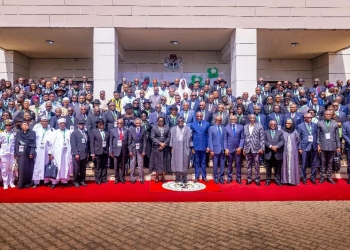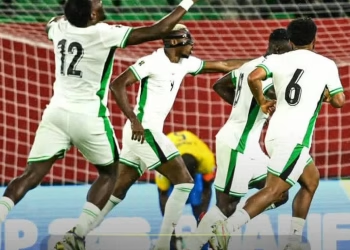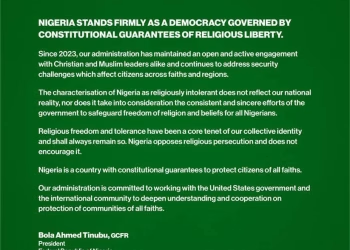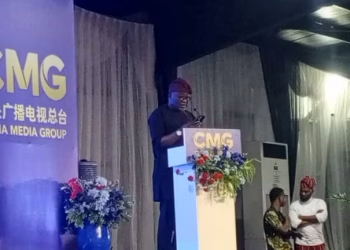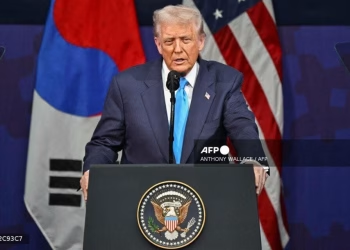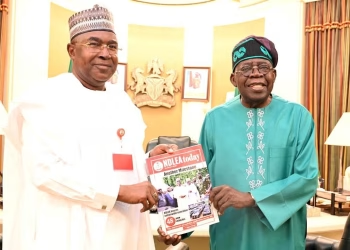Almost one month after the country secured a major legal victory by halting the enforcement of the $11 billion arbitration award in favour of P&ID, Nigeria has terminated its $1.1 billion civil claims against Oil giants: Shell and Eni, over OPL 245 and committed to no further legal action.
Nigeria will also “irrevocably” waive the right to any further legal action in Italy against Eni, its affiliates, and current and past officers in regard to rights for the field, known as Oil Prospecting License 245, or OPL 245. Operations at the Nigerian oil block have been halted for more than a decade by a series of trials and competing legal claims. The area is considered to be potentially one of the richest concessions in the country, with recoverable reserves of 560 million barrels, according to Eni’s estimates.
Whether Eni and its partner Shell Plc could finally begin to develop OPL 245 may depend on the resolution of other claims, including arbitration proceedings filed by Eni at the World Bank’s International Centre for Settlement of Investment Disputes and litigation within Nigeria.
Eni, Shell and some of their former and current managers had already been definitively acquitted last year in a criminal case in Milan, in which they were accused of knowing that much of the $1.1 billion they paid to acquire OPL 245 would be distributed as bribes.
The Oil Prospecting Licence (OPL) 245, according to investigations, is the oil block containing the largest deposit of both oil and gas in Sub-Saharan Africa. The block, considered the richest in Africa, is estimated to contain over 9 billion barrels of crude and even larger volume of gas reserves. OPL 245 alone can provide all Nigeria’s oil production needs for over a decade. The block was awarded on April 29, 1998 by the Sani Abacha government to Malabu Oil & Gas Ltd with a signature bonus of $20 Million.
Dan Etete, being the Petroleum Minister who oversaw the process was the second largest shareholder in the company that got the contract while Mohammed Sani Abacha whose father, General Sani Abacha, was the president that awarded the contract had the largest shareholding in the company that won the award. OPL245 was awarded to Malabu “against all known Government regulations” and “before a formal application was submitted by the company,” the EFCC noted.
OPL 245 Newsroom Nigeria gathered, was originally allocated to Malabu in 1998 on a sole risk basis. Under this arrangement, Malabu held both the Concessionaire rights and the Contractor rights, with the government reserving the right to a participating interest (back-in rights) for future OMLs.
Specifically, the original allocation letter for OPLs 214 and 245 stated: “that the allocated blocks would be operated on “Sole Risk” basis but with the understanding that the Government reserves the right to a participating interest at any time in the life of any subsequent Oil Mining Lease when it so wishes.”
Since its award, the oil block has change hands from Malabu to oil giants Shell and Eni; and currently in the hand of the Nigerian government due to various struggle for control, legal battles as well as scandals.
Ultimately, through a mediation process overseen by Nigeria’s former Attorney General, Mohammed Adoke, Shell and Eni agreed to pay the sum of $1.3 Billion as the price of the bock and signature bonus which was transferred to an escrow account opened by the Nigerian Government with JP Morgan in London.
This means that, $1.092 Billion was paid to the company, Malabu as compensation while the Federal Government earned the $207 Million Signature Bonus.
In the end, while there are litigations on some of the money, amounting to a total of $290 Million; again based on advice given by the then Attorney General of the Federation, Mohammed Bello Adoke to JP Morgan , the London Bank which was to transfer the money, the remainder of $801 Million was controversially transferred to Malabu from the Escrow account.
“At the expense of Nigeria, only a few individuals shared the proceeds of corruption, the $801 million received by Etete’s Malabu,” Mr. Suraj Olanrewaju Chairman, Human and Environmental Development Agenda, HEDA said.
A timeline of events in the asset showed that Nigerian government awarded OPL 245 for $20 million to Malabu Oil and Gas. Court documents later showed that Malabu was owned by Dan Etete, who was oil minister at the time, and people close to former military ruler Sani Abacha.
In May 1999, Etete, on behalf of Malabu, paid $2.04 million for the OPL 245 licence out of the $20 million the company had agreed to pay. Two years later, Shell signed an agreement to acquire a 40 per cent stake in OPL 245 from Malabu.
In July 2001, the Nigerian government under President Olusegun Obasanjo revoked Malabu’s OPL 245 licence, triggering legal disputes over its ownership that dragged on for years.
In November 2006, Malabu reached a settlement with the Federal Government of Nigeria (FGN) and agreed to pay $218 million to FGN in return for the licence being fully reinstated to Malabu. Malabu subsequently failed to pay.
Around April 2007, Shell launched arbitration against the Nigerian government for “wrongful expropriation” of its rights and in December 2010, Mohammed Abacha, son of the former Nigerian ruler, launched a legal challenge arguing that Etete pushed him out of his partial ownership of Malabu.
In May 20, 2011, a $1.092 billion is placed in an escrow account opened by the Nigerian government with US bank JP Morgan. In August, $875 million is transferred to bank accounts in the name of Malabu, while in 2014, Nigeria’s House of Representatives voted to cancel the OPL 245 deal, calling it contrary to the laws of Nigeria.
Seven years later, in 2017, Nigeria filed a case at London’s High Court against US bank JP Morgan alleging negligence for its role in transferring the $875 million to Etete’s Malabu. JP Morgan described the allegations as “unsubstantiated and without merit”.
The case has now effectively ended with Nigeria withdrawing the case against the oil giant. The country which has been unable to ramp up oil production, has been doing everything to ensure that some of its assets which have been lying fallow begin production as soon as possible.
Before the cessation of legal hostilities last week, HEDA had last year, called on President Muhammadu Buhari to reject the advice of the Attorney General of the Federation, Mr. Abubakar Malami, to abandon the OPL 245 prosecutions in the country. The civil society organization has been closely following the case since 2012 and described Mr. Malami’s advice as dishonest and misleading.
In a letter to the President signed by its Chairman, Olanrewaju Suraju, HEDA argued that abandoning the prosecutions would send a signal that companies are insulated from prosecution where prosecutions are likely to interrupt significant but corruptly-obtained money flows. The group maintained that this would be the opposite of the United Nations Convention against Corruption’s requirement.
The Anti-Corruption group also criticized Mr. Malami’s failure to give candid advice to President Buhari regarding Nigeria’s international law obligations. The group cited what it called “the series of losses” that Nigeria has experienced in the OPL 245-related cases. The letter also cited a number of examples of Malami’s alleged misrepresentations, including his assertion that the prosecutions were a lost cause and that the companies had no case to answer.
HEDA argued that this was contradicted by Malami’s approval of an appeal by the Nigerian government to the Italian Supreme Court in its civil claim against Eni and Shell in Italy. They also pointed out that Nigeria had won its first case in London, resulting in the return of $80 million to the national coffers, and that $115 million remains frozen in Switzerland as a result of the legal team’s efforts.
The Civil Society organization accused Malami of failing in his duty to provide the president with the facts necessary to make an informed decision on the matter and of being disrespectful to both the president and his office. They also disputed Malami’s claim that the policy “summersault, litigation, and disputes” surrounding OPL 245 were deterring investors.
HEDA further warned that abandoning the OPL 245 prosecutions would constitute a breach of Nigeria’s obligations under the United Nations Convention against Corruption (UNCAC) and would alarm investors who wanted to see corruption routed from the country.
HEDA, however, expressed confidence that President Buhari would reject Mr. Malami’s misleading advice, given the president’s commitment to UNCAC and upholding the rule of law by fighting corruption. The group also expressed hope that President Buhari’s successor would be as committed to the struggle and better served in the choice of Attorney General.



